UW Competes in the International Case Competition at Maastricht University
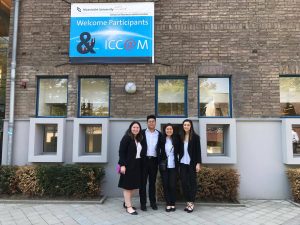
UW’s International Case Competition at Maastricht Team (l to r): Kim Perdue, Chris Kim, Stephanie Lim, and Kalei Munsell.
Early May found four Foster students on their way to a small university in the southern teardrop of the Netherlands, just a few kilometers from Belgium and a few more to Germany. Maastricht University is situated in the oldest city in the Netherlands and has the Roman walls and cobblestone streets to prove it. The business school is housed in a renovated monastery and, during the week of May 7 through 13, hosted 16 teams from around the world for the International Case Competition at Maastricht (ICC@M). While jet-lag is always a foe at international case competitions, the UW team of Kalei Munsell, Chris Kim, Kim Perdue, and Stephanie Lim powered through to represent UW extremely well against a tough field. While the team did not advance to the final round, they made lasting connections with their fellow competitors and had the opportunity to learn new presentation and analysis techniques from some of the best in the world. Below are some reflections from the week:
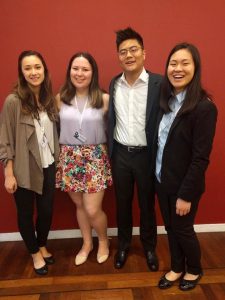
“May 7-13, 2017 was one of the most inspiring, intense, yet fun-filled weeks of my college career.
Even though I have had the opportunity to participate in a couple of case competitions nationally at Georgetown University (it was so great to see one of the girls I met at Georgetown at ICC@M!), Brigham Young University, and numerous competitions locally at Foster, it was an inspiring and a humbling experience to learn how other schools from around the world (16 teams from Canada, Oceania/APAC, Europe, and the US) train for case competitions. Before we got to know the competitors from an academic standpoint, we immediately broke the ice on the first day by getting to know them on a more social level in a relaxed environment before the competition starts. This is just one aspect of how ICC@M is different from other case competitions.
By talking to the other competitors of this competition, I realized why business schools put so much emphasis on case competitions as this is one metric of how business schools increase their brand recognition and perception around the world. Case competitions, especially international ones, are so important as all of these schools are watching you on an international stage; the stakes are higher and the rewards are just as high.
To say the least, I am incredibly honored to have had this opportunity to participate in this case competition with some of the brightest minds from Foster. I am grateful to have made great friends from around the world through this competition and to constantly be inspired by them to continue to better myself and others. Without the generous donations of Foster alumni and the Global Business Center, this experience would not have been possible. Thank you, donors, for the continuous support and for providing students with international opportunities and memories that last a lifetime.”
– Stephanie Lim ‘18
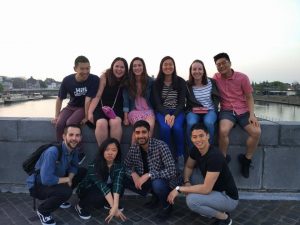
The UW and University of British Columbia teams, and their Maastricht hosts, on the Sint Servaasbrug Bridge in Maastricht.
“Despite my experience in competing in numerous case competitions at UW, competing on a global scale is always quite the shock. Suddenly your competition comes from different professional, business, and educational backgrounds. Rather than competing against students who go through the same coursework and preparation as you, you’re in a flight of students from every corner of the world with every background possible. And it’s the best learning experience a business student could ask for.
I can honestly say that the opportunity to compete at the International Case Competition at Maastricht is one of the best experiences I’ve come across at UW so far (and not just because I got a trip to the Netherlands out of it). In the past year or so, I’ve studied abroad and competed in three international case competitions, and from this I’ve learned the value of getting to meet other students from around the world. Being able to network with people from Universities in Asia, Oceania, Europe, and more has led me to some of the most enlightening conversations of my life. Suddenly you’re exposed to different viewpoints about absolutely everything: politics, lifestyle, and of course, how to solve a business case.
The ability to watch the top schools in the world solve and present the same case that you just spent 24-hours staring at, is one of the best ways I’ve been able to learn. At UW, I think a lot of students get stuck in the “UW-Mindset”. We have a very specific set of socially accepted rules to analyze cases, design PowerPoints, and deliver presentations. Watching other universities compete in a completely opposite manner and succeed at it really opens your eyes to the other possibilities. It shows that there is no “right” or “wrong” way, but there’s always something new to learn. I saw analysis frameworks I’d never seen before, presentation styles that made an impact, and people that knew exactly how to portray themselves.
Beyond the cases themselves, our team got a chance to meet amazing students, coaches, and professionals from all around the world. I can’t say enough about how much I value the friendships I’ve formed abroad, and how excited I am to have friends in all different corners of the world. This global network is something that will provide my professional and social life with benefits for years to come.
With all that being said: thank you to the GBC for this opportunity, my amazing teammates and all the hard work they put in (Kim, Chris and Stephanie), our outstanding coach Angela for all the endless support, our lovely team host Annemarie for everything you did to help us survive the week, and every other person that I met along the way that made an impact on my life. I will forever be grateful for the opportunity that I had and the lessons that I’ve learned, and I would encourage anyone who’s considering getting involved in the case competition community to go after it with all they have. I’ve seen myself grow on a professional, academic, and personal sense in the past couple years of competition, and I hope to give back to the community that made this happen in any way possible.”
– Kalei Munsell ‘18
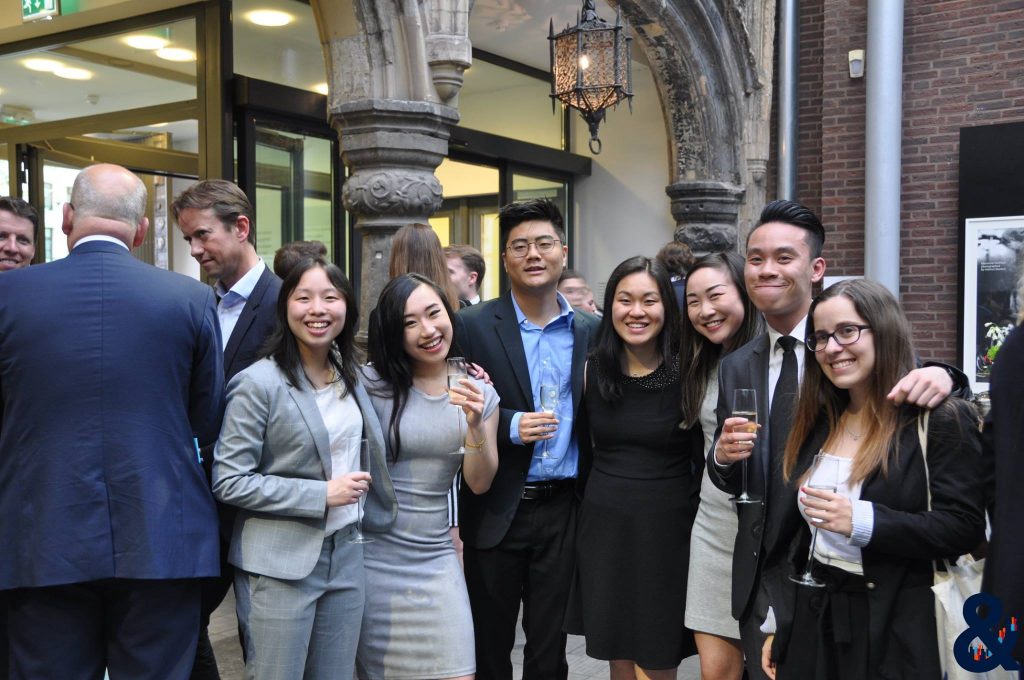
Part of the UW team with the Simon Fraser University team, from Vancouver, British Columbia, at the closing ceremony.
“Four cities, 11 days, 30 hours of case preparation, countless new friends, and memories to last a lifetime. From Hungary to Alberta and Singapore to Portugal, 16 teams traveled to the little town of Maastricht in the southern part of the Netherlands to compete in the International Case Competition at Maastricht (ICC@M). Among those teams, I was fortunate enough to represent the Foster School of Business along with Kalei Munsell, Chris Kim and Stephanie Lim.
With two 3-hour competitions and one 24 hour one, it would be an understatement to say we were exhausted by the end of the week. Although we did not perform as well in competition as we would have liked, competing in ICC@M is easily the highlight of my college career. Each of the cases had a “European flair” – as the director of the program liked to call it – which increased our learning curve quite a bit. We not only had to familiarize ourselves with the different government operations and the European Union, but also the cultural differences and societal trends around Europe. Although increasing the difficulty in our situation, I think the European centered cases made the competition feel more authentic as many of our judges were representatives from these companies. The knowledge I gained from this trip extends beyond any possible classroom experience. Learning about international companies and solving problems for them that can be implemented into their business furthered my passion for international marketing. Additionally, meeting other students from around the world and observing their different mindsets and how they approach problems expanded my world view even more – I also now have friends all over the world I can go visit! In all, I am incredibly thankful for ICC@M and am proud to have represented Foster so far from home.”
-Kim Perdue ’19
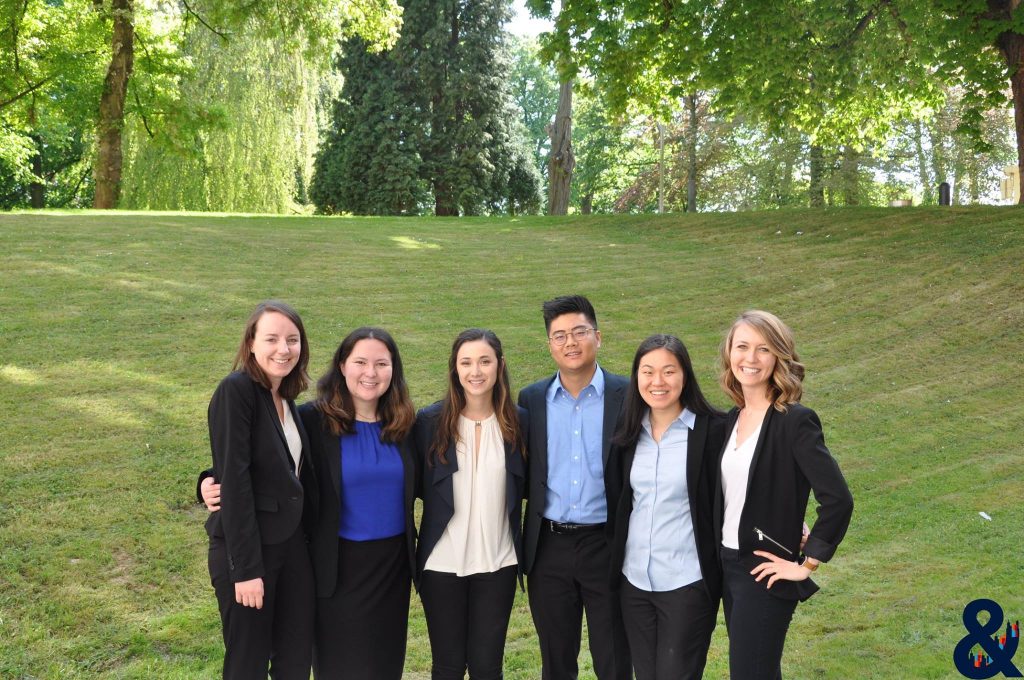
Our Maastricht University host, Annemarie (far left), the UW team, and their adviser, Angela Shelley (far right), during the first day of competition.
“Participating at the ICC@M only reaffirmed my fondness for Europe. I studied abroad in Germany just this past autumn 2016, and I never expected to be on mainland Europe again so soon. As I first set foot outside of the airplane that had touched down in Brussels, I felt both nostalgia and excitement; the former because of the flood of memories of Europe that came back all at once, and the latter because of what was in store that week.
Our advisor (Angela) and I had come to Maastricht the day of the competition kick off – and so we were quite jet-lagged. I would remain that way for the next couple days, but for the first day, I was able to rally, thankfully through the encouragement of my teammates. That night, at our kick-off social outing, I was able to show my grooves, which I had awoken in Germany, on the dance floor. Over the next few days, in the flurry of socials, competition and sleep depravity, I was able to meet some fine competitors from around the world. In particular, our team befriended the UBC (University of British Columbia) team. I had never given much thought to our Canadian university neighbors just across the border and only about 2 or 3 hours away, but by the end of the week, I had garnered much respect for not only the team members, but also Canada as a whole, whose case competition culture, while a little different, seemed to be both significant and intense.
Our team also got along very well with our team host, Annemarie, who happened to be a German international student studying at Maastricht. Through Annemarie, we learned that indeed many or even a majority of the students at Maastricht University hailed from Germany. I found this to be surprising, and took advantage of this chance coincidence to re-engage my German language skills whenever I could.
In addition, what I took away from this was that within Europe, top students were crossing borders to go to universities outside of their home country. This internationality is something I found also in Mannheim, Germany, and is something I admire about Europe in general. A majority of students in Europe are not only learning their curriculum in English, a foreign language, but many are also fluent in at least one or two other languages outside of their native tongue. This gives them flexibility in career prospects and also appeal of a globally-minded individual, something I have been aspiring to be throughout the course of my studies as a dual degree major in business administration and international studies, my competing in international case competitions, and my study abroad journey in Mannheim, Germany. I hope to continue to foster this global attitude that the GBC inspires and encourages and hope to be back in Europe soon!”
-Chris Kim ’18
